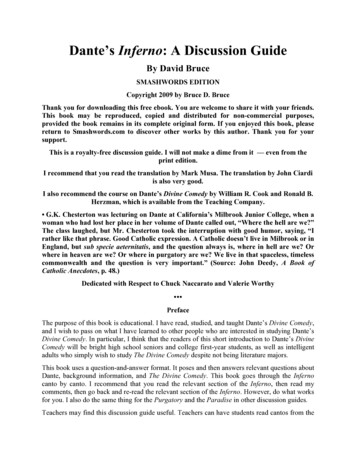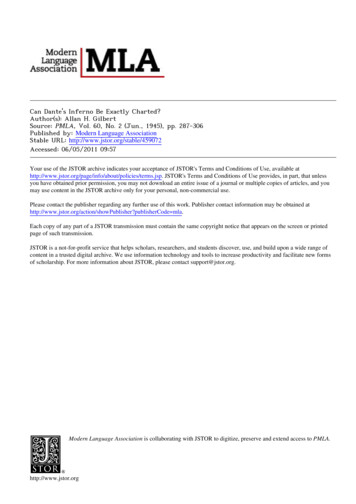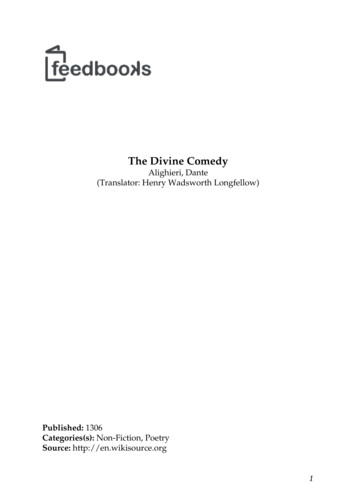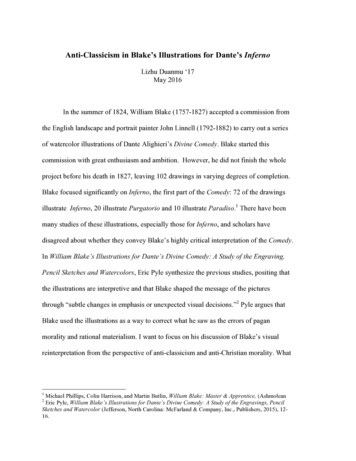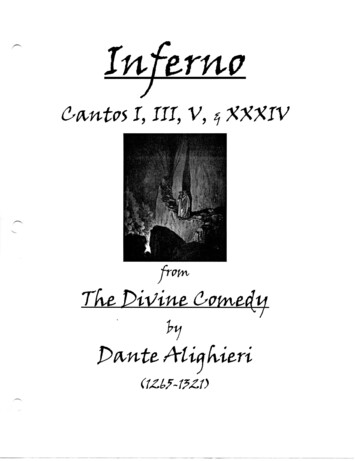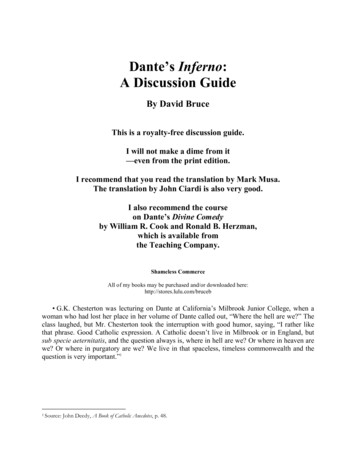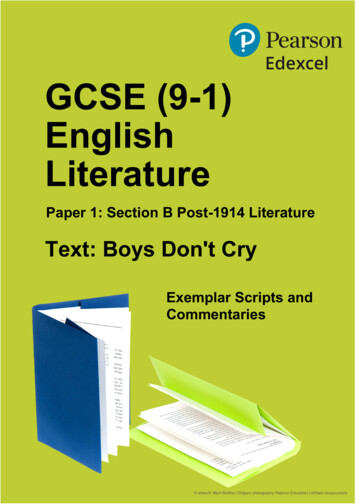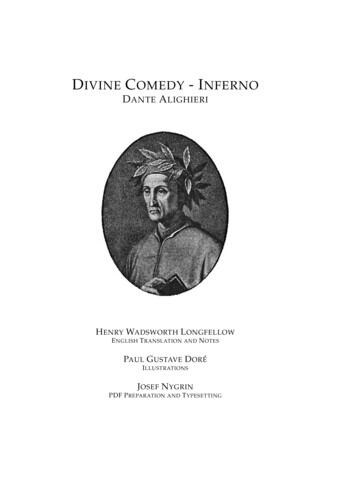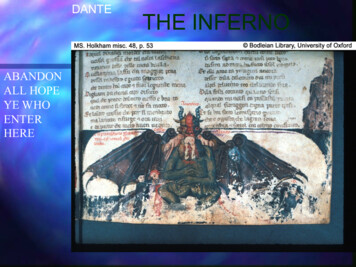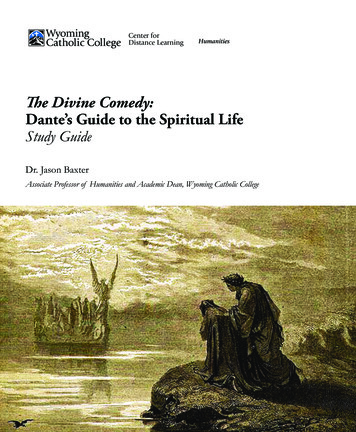
Transcription
Center forDistance LearningHumanitiesThe Divine Comedy:Dante’s Guide to the Spiritual LifeStudy GuideDr. Jason BaxterAssociate Professor of Humanities and Academic Dean, Wyoming Catholic College
Copyright InformationLectures: 2016 Jason BaxterStudy Guide: 2017 Wyoming Catholic CollegeExcerpts from Inferno by Dante Alighieri, translated by Robert and Jean Hollander. Copyright2000 by Robert Hollander and Jean Hollander. Used by permission of Penguin RandomHouse Audio Publishing Group, a division of Penguin Random House LLC.Excerpts from Purgatorio by Dante Alighieri, translated by Robert Hollander and Jean Hollander. Copyright 2005 by Robert Hollander and Jean Hollander. Used by permission ofGeorges Borchardt, Inc., on behalf of the translators.Excerpts from Paradiso by Dante Alighieri, translated by Robert Hollander and Jean Hollander. Copyright 2007 by Robert Hollander and Jean Hollander. Used by permission ofGeorges Borchardt, Inc., on behalf of the translators.All rights reserved. The guide's translations are by Jason Baxter.Cover Image: “Dante kneeling before celestial helmsman” by Paul Gustave Doré; Public Domain
IntroductionWyoming Catholic College is a four-year coeducational Catholic college whose primary educational objective is to offer a traditional liberal arts education that schools the whole person in allthree dimensions—mind, body, and spirit. We accomplish this by immersing our students in thebeauty of the outdoors, by introducing them to the wisdom of Western tradition and thought asfound in the Great Books and Good Books of the past millennia, and by making the best of theCatholic spiritual heritage part of the rhythm of daily life in our College community. Studentsgraduate with the degree of Bachelor of Arts in Liberal Arts.The Center for Distance Learning shares the mission of Wyoming Catholic College by offeringcourses, podcasts, retreats, and other opportunities designed to provide adult learners with soundreasoning skills, growth in the virtues, and a broad understanding of the rich heritage of WesternCivilization in the context of Catholic faith and practice.About This CourseThe early twentieth-century author, essayist, and Christian humanist Dorothy Sayers learned Italian so that she could read Dante Alighieri’s Divine Comedy in the original language. Sayers, whosetranslation of the Comedy is still in print, once called the poem “the drama of the soul’s choice.”C. S. Lewis read the Inferno in Italian when he was a teenager. He read the Purgatorio in a militaryhospital while he recovered from wounds received in the trenches of World War I. Then in 1930he read the Paradiso. Writing to a friend about its overwhelming power, he said, “I think it reaches heights of poetry which you get nowhere else; an ether almost too fine to breathe. It is a pity Ican give you no notion what it is like.” Soon after, Lewis, the adamant skeptic, became a believingChristian.Pope St. John Paul II said, “Dante’s art evokes lofty emotions and the greatest convictions, and stillproves capable of instilling courage and hope, guiding contemporary man’s difficult existentialquest for the Truth which knows no setting.” Pope Benedict XVI said that in his first encyclical,Deus Caritas Est, he “wanted to try to express for our time and our existence some of what Danteboldly summed up in his vision.” And Pope Francis as he announced the Year of Mercy urgedCatholics to turn to Dante in order to “rediscover the lost or obscured meaning of our humanpath,” calling its author “a prophet of hope, herald of the possibility of redemption, of liberation,of the profound transformation of every man and woman, of all humanity.”This masterful work of epic poetry, with its great sweep of time and eternity, depths of Hell andheights of Heaven, is our subject. In this course Dr. Baxter gives you the tools needed to appreciateand benefit—intellectually and spiritually—from one of the greatest pieces of literature ever composed. “My desire,” he said, “is to help readers, to help you, come to appreciate the depth of thispoem, to understand its extraordinary and radical message, and to recognize the contemporaryrelevance—perhaps even urgency—of this medieval poem.”
Your ProfessorDr. Baxter is Academic Dean and Associate Professor of Fine Arts and Humanities at Wyoming Catholic College, where he teaches Greek, Roman, and Medieval humanities courses,as well as art history from antiquity through the Baroque. Dr. Baxter has also taught rhetoricwithin the Trivium sequence and is responsible for designing Trivium 302, the Junior AuthorProject. Dr. Baxter’s primary research interests include medieval aesthetics; the relationshipbetween the Platonic tradition and poesis, both visual and verbal; Dante and the Platonictradition; Dante, medieval mysticism, and monastic spirituality; and the relationship betweenthe Middle Ages and the Renaissance. His scholarly publications include articles on the Platonic tradition in the Latin West, and writings on Dante.He earned his Ph.D. in Literature and an M.A. in Italian Studies at the University of NotreDame and a B.A. in Classical Philology at the University of Dallas. In 2018, two books by Dr.Baxter were published: A Beginner’s Guide to Dante’s Divine Comedy, published by BrazosPress, and Falling Inward: The Humanities in the Age of Technology, from Cluny Media Press.How to Use This GuideWhile the lectures in this series can be shown to large groups, this guide is designed for eitherindividual study and reflection or small group (up to fourteen people) study and discussion.If you are using this course with a small group, someone will need to serve as a facilitator.This could be the same person for the entire course or a different person for each lesson. Itis important that this person see himself or herself as a facilitator, not the group’s teacher. Agood facilitator has a grasp of the material, but rather than sharing what he or she knows, asksquestions and fades as much as possible into the background. This allows the group to struggle with the questions through conversation. Not only is this much more interesting for thegroup, but it is a far more effective way of learning.The facilitator’s role is to keep the discussion on topic and directed at the lecture and thetexts under consideration, while allowing the group to draw its own conclusions. Whetherstudying alone or in a group, discovering the beauty and meaning of classical literature is alife-long pursuit. There is no hurry, and this kind of audio-based adult distance learning program allows you to proceed at your own pace. Having said that, however, it’s easy to allow thebusyness of the day to keep you from seemingly optional activities such as reading and study.Set realistic goals for doing the readings, listening to the lectures, and reflecting on what youhave learned. You will probably not “find time” for this course. You will need to “make time.”Each lesson has five parts: Getting Started, Read, Listen, and Reflect. These do not need to bedone all in one sitting. At the same time, we encourage you not to skip over any of the sectionsor questions. We also encourage you to begin and end your study with prayer for a teachablespirit, clarity of thought, and wisdom in application.
Getting Started: This section has two goals. First, it allows the individual learner or smallgroup members to transition from all the things that have occupied their attention throughthe day to the topic under discussion. Second, it is designed to connect the topic with personalexperience, engaging the mind and the imagination. Read: The lectures and this guide are companions to Dante’s Divine Comedy, not a substitute. Thus, it is highly recommended that you read the assigned canti before listening toeach lecture. The more reading you do, the more you will get out of the course. Even if thisextends the course by weeks or even months, taking the time to read the Comedy will deepenyour understanding and make the course that much more beneficial. Whenever possible, werecommend you use your own copy of the Comedy, allowing you to read with a pen in handto underline and make notes. Listen: Set aside some undisturbed time to listen. Each lecture lasts between 30 and 45 minutes and is best considered as a whole rather than a bit at a time as you run errands aroundtown listening piecemeal in your car. We strongly encourage you to listen with the text openand a pen in hand to take notes in the space provided in this guide, in the text’s margins, orin a separate notebook. Remember that if you miss something Dr. Baxter has said, you canalways go back and replay a portion of the lecture or the entire lecture. Reflect: The guide comes with questions for you to consider after listening to each lecture.Reading them prior to listening to the lecture may help you focus on the issues raised. Thesequestions are not an exam, but are designed to help you interact with the speakers and—muchmore importantly—with the authors of the great works of literature you will be studying.Again, have a pen in hand and use a notebook to jot down your thoughts.On Reading Poetry: The texts we will be considering in this course are poetry, and mostpeople today no longer read poetry. As a result, some of you may be in unfamiliar territory.Reading poetry simply takes practice. Here are two suggestions. First, consider reading atleast parts of the Comedy aloud. The poets use words in part for their sound, so sound themout and listen as you read. Try reading a bit of the Italian as well. Second, pay attention to thepunctuation. Phrases will often continue from one line to the next and pausing at the end ofevery line will obscure rather than clarify the meaning. The more you read poetry, the betteryou will become at understanding it and the more you will appreciate it—a life-long benefit ofthis distance learning course.On Translations of the Comedy: While there are numerous good translations of the Comedy, the one recommended for this course is one by Robert and Jean Hollander. The editionincludes the original Italian along with the English, plentiful notes, and outstanding introductions. If you choose another translation, we urge you to make sure it is in verse form, notconverted into prose.
Lecture 1Lover, Poet, Exile: An Introduction to Dante’s ComedyWhile the Divine Comedy describes a spiritual journey that all humans share, the work also reflects the particulars of Dante’s time, place, and personal history. Written around the turn of the14th century, the Comedy is filled with allusions to the politics of Dante’s home city of Florenceas well as the politics of Italy, the papacy, and Europe. Dante built the poem on Medieval theologyand cosmology. And the poem reflects Dante’s personal life: his youth, his love for a girl and hersubsequent death, his career as a poet, soldier, and politician, and his exile from the place wherehe was born. Understanding the literary, cultural, political, and personal context of the poem isstep one in understanding. Getting Started: What are your hopes for this course? What would you like to achieve?When you hear the word “Medieval,” what comes to mind? Read: Rod Dreher, “How Dante Saved My Life” in The American Conservative, April 9, dante-saved-my-life/).Virgil, The Aeneid, Book 6. Listen Reflect:1. “It’s a famous fact,” says Dr. Baxter, “that the more you read in Dante, the harder it gets. . . .Dante structured his poem to get higher, lighter, and more abstract as we ascend and get closerto God.” Why would you expect Dante to do that? How is sin more concrete and comprehensiblethan holiness?2. After quoting Pope Francis, who said Dante was “a prophet of hope, a herald of the possibilityof . . . the profound transformation of every man and woman,” Dr. Baxter asks, “Could it reallybe true that an old poem can redirect the course of our world, which seems too eager to destroyitself?” How would you answer Dr. Baxter’s question?3. Dante began as a love poet, writing popular songs about emotion and romance. Yet in hisbook Vita Nuova or The New Life, he showed the “desire to elevate a popular form of writing—thelove song—to a theological level.” How would you explain the connection between romantic loveand theology? In what ways is the love of man and woman analogous to the love God has for hispeople?4. “For Dante,” argues Dr. Baxter, “love is not just exciting, it’s ennobling. He believed along withthe vernacular literary tradition that when you fall in love, then you are braver, more virtuous, andso on, but most importantly, you are more alive and vital. You see the world with new vigor.” Whydo you agree or disagree? How can this kind of love (amore) also be bitter (amaro)?
5. How did Dante’s love for Beatrice and her subsequent death inform his view of love? How,according to Dr. Baxter, did his love for Beatrice inspire Dante to pull together the joys of earthlylove and the joys of heavenly bliss?6. How did Dante’s suffering—the death of Beatrice and his exile from Florence—inform hispoetry? How did it form in him what Dr. Baxter calls “prophetic sensibility . . . the power to lookdown into the root causes of problems of society and awaken men to a love of goodness again”? Additional Resources:C. S. Lewis, “The Weight of Glory” in The Weight of Glory and Other Essays, HarperOne;Revised edition, 2001.C. S. Lewis, The Discarded Image: A Guide to Medieval and Renaissance Literature, Cambridge University Press; Reprint edition, 2012.Lecture 2The Hero and the Coward in the Dark WoodMidway in the journey of our lifeI found myself in the midst of a dark wood—the true way was lost.With those now famous words, Dante the poet began his vast epic of the spiritual life. And withthose words we meet Dante the pilgrim, someone to whom we immediately relate. The darkwood—“savage, harsh, and difficult”—is not unique to this one man in the early fourteenth century. Most people at some point in their lives have been to that place of defeat, disillusionment,depression, and despair. And many find, as Dante did, that the way up is the way down. Getting Started:When was it that you came to yourself “in a dark wood?” How did you lose thestraight way? How did you find your way back? Read: Inferno, Canti 1–5 Listen Reflect:1. How would you explain the distinction between “Dante the poet” and “Dante the pilgrim”?How does this correspond with Dr. Baxter’s comments about the poem being “a cinematic experience”?2. Dr. Baxter comments, “The whole of Canto 1 is an extraordinary poetic achievement in its ability to create a dream-like feeling. It’s almost nightmarish, isn’t it? We feel the kind of irrational painand fear of the pilgrim, as he’s locked in a terrible dream.” What elements of the canto contribute tothis feeling of a dream or nightmare? How does Dante communicate that he was very much awake
rather than asleep?3. At the end of Canto 1, Dante eagerly entreated Virgil to lead him where he would, butin Canto 2, he expressed doubt at the enormity of the journey and about his fitness for thetask—“I am no Aeneas, nor am I Paul.” Virgil responded by telling Dante, “you are plaguedby a small-souled cowardice [viltade].” In what ways was this an apt description of Dante’sdoubts? How does such cowardice produce the kinds of spirits Dante and Virgil see amongthe Indifferent (3.22–69)?4. In his Wyoming Catholic College distance learning course, “Classical Literature and Hope,”Dr. Glenn Arbery comments that “[epic] hope involves divine prompting, even a divine mandate. For the ancient Greeks and Romans, this kind of hope is rare, because the heroes whohave it already possess a unique greatness of soul that seems to merit divine attention.” Howdoes Virgil’s explanation of why he went to seek Dante in the dark wood (2.49–120) draw outDante’s “unique greatness of soul”? How does the explanation place the Comedy in the tradition of the great epics including The Iliad, The Odyssey, and Virgil’s Aenead?5. The inscription over the Gates of Hell (Inferno 3.1–9) announce, “DIVINE POWERMADE ME, / HIGHEST WISDOM AND THE FIRST LOVE.” While Dr. Baxter makes itclear that Dante will not fully explain why God created Hell until the pilgrim finds his wayto Purgatory and Paradise, Dante is nonetheless comforted by Virgil. How does slaying “allcowardice” (3.12) allow Dante to continue on without an explanation?6. Dr. Baxter quotes the scholar Guglielmo Gorni who wrote, “Virgil saves Dante from an existence dominated by the contingent, by accidents, by the vanity of things.” Then he explains,“In other words, being lost in the dark wood is not necessarily connected to sinful living oreven neglecting your daily duties. It’s a loss of the deep, inspiring memory of why you are doing those things you must do. It’s a forgetfulness of the big dream.” How does this alone makethe Comedy a book for our era?Lecture 3On Castles and LoversAs Dante enters Hell proper, he hears not the music of the spheres, but the never-ending,raucous, vile, cacophonous din of souls in torment. Even in the relative peace of Limbo, adeep sense of hopelessness hangs over everyone and everything. After visiting with the soulsin Limbo, Dante and Virgil begin their descent into what Minos the judge calls “this abode ofpain.” As they enter the first circles, they meet those who loved good things, but in distortedand thus evil ways. Getting Started: When have you felt that something was hopeless? How does hopelessnessfeel?
Read: Inferno, Canti 6–9 Listen Reflect:1. In his discussion of the great souls in Limbo, Dr. Baxter cites Alan Bloom, who “said hisstudents’ minds are like the dusty rooms without any moral furniture or imaginative ornament. Dante’s imagination, on the other hand, as we can see, was crowded with the stories andheroes he venerated.” How does Dante the poet show us the love Dante the pilgrim has for thegreat heroes of antiquity? What value did they have in Dante’s life? What did they teach him?2. The inscription on the gates of Hell (Inferno 3.1–9), Dr. Baxter remarks, is a parody of thechurch or of a good city. For Dante, he says, “sin is, at its base, a mere twisting of somethinggood, a misuse of something beautiful.” How does the story of Francesca and Paulo (Inferno5.100–142) illustrate this notion of sin?3. When asked about his affair with his former wife’s adopted daughter, film director WoodyAllen responded, “The heart wants what it wants.” How does Woody Allen’s understanding oflove—an understanding that is common throughout our culture—mirror Francesca’s? Whyis it a dangerous, self-deceptive, and in the final analysis, sinful view of love? How does thepunishment (contrapasso) of being blown about by the wind fit the crime?4. In the fourth circle of Hell, the avaricious and the prodigals suffer together (Inferno 7.19–65). That, notes Dr. Baxter, seems counterintuitive until we see that their sin is the same. “Bothgroups,” he says, “committed sins against rest.” How do both misers and squanderers sinagainst rest? How is it that “Evil spending and evil grasping have taken / the lovely world fromthem and put them to this scuffle” (7.58–59)5. Dr. Baxter comments about the swamp of the wrathful in the fifth circle (Inferno 7.100–130;8.31–66), “The poet creates an infernal landscape which externalizes the interior condition ofthe wrathful—a small burning wound slowly leaks out anger which pools in the recesses of theheart, dirties the mind, and incapacitates us to think about anything else. Ultimately, it breaksout in expressions of violent rage, but a rage which does not heal but just plunges us back intothe foul-smelling mud.” How is that an apt description of wrath? How is wrath like “carryingsmoke within the heart” (7.123)?6. Virgil’s hero, Aeneas, when he visited the underworld, was not permitted to enter the fortress of Dis (Aeneid 6.535–627). In a similar way, Virgil, having dealt handily with all obstaclesthus far and much to his surprise, gets turned away at the gate of Dis as well. Divine grace inthe form of an angel is required in order to open the door to lower Hell so that its depths canbe explored (Inferno 8.76–9.102). What does this say about the limitations of human reasonand virtue and about the need for grace and faith?
Lecture 4The Graveyard of the Heretics and the Wasteland of the ViolentWhen Dante and Virgil finally step through the gate into the fortress of Dis and the realms oflower Hell, they discover what the demons guarded so tenaciously: a graveyard. The graveyard marks their entrance into those circles of Hell where the malicious are punished, thosewho were “willing to hurt fellow human beings (or themselves) to get what they want.” Inthe graveyard they encounter the heretics chewing on old resentments and then descend tothe realm of the violent before descending to the deepest pit of Hell, the circles reserved fortraitors. Getting Started: What characters in literature or film can you identify who became bitterand hateful due to an old resentment they refused to let go of? What effect did their bitternesshave on the lives of those around them? Read: Inferno, Canti 10–17 Listen Reflect:1. In the graveyard, Dante and Virgil encounter “Epicurus and all his followers: / they heldthat the soul dies with the body” (Inferno 10.14–15). How does this worldview lead easily tothe sin of Farinata (idolatry of position and place), Calvalcanti (idolatry of family), and Brunetto Latini (idolatry of fame)?2. Cavalcante de’ Cavalcanti, who believed that the soul dies with the body, is nonethelesssuffering in Hell now that his earthly life is over (Inferno 10.52–72). “Where is my son?” hebegins, “Why is he not with you?” Then, misunderstanding Dante’ response and assuminghis son is dead, he falls back into the grave in despair. How does Cavalcanti’s materialisticphilosophy and the fact that he is among the heretics explain these seemingly contradictoryresponses?3. Rather than being obsessed with family, Farinata degli Uberti, who also believed that thesoul dies with the body, lives beyond the grave obsessed with the old political rivalries thatoccupied his earthly life, but are no longer germane (Inferno 10.22–121). “His resentmentsmolders within him, forever.” Comments Dr. Baxter, “He has, as it were, been given exactlywhat he wants. He remains committed to his party, with a fanatical, sectarian devotion, forever. Farinata holds one truth, maintains one loyalty.” In what way has Farinata “been givenexactly what he wants”? How does his materialism and earthbound focus explain his condition in Hell?4. Descending deeper into Hell, Dante and Virgil come to the woods of the suicides, where
they meet Pier della Vigne. Pier presents himself as a victim who, Dr. Baxter tells us, wishes toappear innocent. While Dante and, through the poet, we are moved to pity, is Pier truly to bepitied or is he manipulative in his self-pity? How does he still make an idol of his reputationand status?5. In his discussion of Dante’s meeting with his mentor Brunetto Latini in the fiery desert ofthe sodomites (Inferno 15.19–124), Dr. Baxter points out that for Dante, sodomy “consistedof any use of human sexuality which was not formally open to the procreation of children. . . .Thus, the sin, at its base, seems to be a sin against fruitfulness; the transformation of a fruitfulact into a sterile one.” In what ways does Dr. Baxter believe that Latini was barren, “a kind offailed father” to Dante, thus deserving the contrapasso of eternity in the barren desert of fire?6. After describing the poetry of Dante and Virgil’s flight on Geryon’s back, Dr. Baxter leavesus with two questions: “Why compare the form of the message to this strange, hybrid monster, a beast made out of the stuff of ancient mythology, and then a wild ride in which we feelthe dizzying twists and turn of the rapid, wind-rushing descent? Why take the old myths, theuntethered working of the imagination, and submit them to the service of Christian truth?”How do you answer?Lecture 5Dante’s White-Collar Criminals and Ulysses’s Tongue of FireThe upper circles of Hell hold the incontinent, those whose loved good thing in wrong ways.Inside the walls of Dis, in lower Hell, the malicious suffer, those who, as Dr. Baxter puts it,were willing to use force against the natural laws or force against neighbor to get what theywanted. These include the fraudulent, those who “misused that most precious gift of humanity: our speech-making, word-crafting, image-producing intellect” to harm their fellow humans in order to have their own way. Getting Started: Have you or has anyone you know ever been scammed? What did it feellike? Read: Inferno, Canti 18–26 Listen Reflect:1. Do you agree with Dr. Baxter that the characters Dante meets in the ditches of Malebolgeare “white collar criminals”? Why or why not?2. “For Dante,” Dr. Baxter argues, “it is a sacred act to speak, and obfuscating the vision of
reality by abusing language is a serious sin in his eyes.” How did Jason (Inferno 18.82–99),Pope Nicholas III (19.43–123), the false prophets (20), and the hypocrites (23) sin with words?3. In his second lecture, Dr. Baxter defines contrapasso as “the principle that the punishmentbalances out the crime; it turns the sin inside out, as it were, and in doing so its full horrorbecomes evidenced for the first time.” How do the punishments in the Malebolge fit the corresponding crimes?4. In his Confessions, St. Augustine wrote, “For You have commanded, and so it is, that everyinordinate affection should be its own punishment.” How does Vanni Fucci (24.121–25.15)illustrate this principle?5. Why is it appropriate that in the ditch where Ulysses and the other fraudulent counselorsare punished, the souls are, as Dr. Baxter puts it, “wrapped in a fiery light which makes themresemble—on the outside at least—the appearance of souls in Paradise”? How is this anotherexample of contrapasso?6. Dr. Baxter compares Ulysses to Aeneas, noting that unlike the founder of Rome, “Ulysseslacks the willingness to found, defend, and cultivate the city. He lacks allegiance to a particularized human community, and he lacks the willingness to remain bound by those humanrelationships.” Reread Ulysses’s speech in Inferno 26.85–142). How did these characteristicsof rootlessness spur Ulysses to set sail and cross the Straits of Gibraltar into forbidden waters,asking his shipmates: “how could you deny yourself the experience / of that land beyond thesun, of the uninhabited world”?Lecture 6Icy Hearts and Frozen Souls: The Lowest Portion of HellContrary to the image of Hell as the realm of fire, Dante describes deepest Hell as a frozen seaof ice. “As Dante and Virgil descend to increasingly lower levels of hell,” begins Dr. Baxter, “wefeel the thermometer dropping—both in terms of the ice which holds the souls imprisoned,but also in terms of the spiritual coldness of the hearts of the individuals they meet.” Sins suchas adultery and wrath are traditionally called “hot” sins. Cold sins include malice, cruelty,and—worst and coldest of all—treachery. Getting Started: Think of an example of betrayal from literature or history. Why wouldtreachery be known as a “cold” sin? Read: Inferno, Canti 27–34
Listen Reflect:1. In the last of the Malebolge and in the frozen plain of deep Hell, Dr. Baxter notes, souls donot want to reveal their names. Why do these souls no longer wish to be remembered? Whatdoes the refusal to be known say about the isolation and bitterness that accompanies sin? Howdo we see that in Guido da Montefeltro (27)? In the schismatics (28)? Sinon and Master Adam(29.100–117)?2. According to Dr. Baxter, “it seems that as the pilgrim nears the bottom of hell, the poetpulls out all the stops in his quest to create the language of breaking glass and finger nails onthe chalkboard, in an attempt to summon and harness the full power of language to conveythe devastating sense of the brokenness of humanity.” How does the language and imageryof these last canti convey the wickedness and betrayal of sin? How is this illustrated in fittingpunishments (contrapasso) of the schismatics (28) and the counterfeiters (29)?3. Beginning in Canto 32, Dr. Baxter states, “the poet, much like the pilgrim, lets all compassion die.” Then he asks, “What on earth is going on? . . . Is the poet of love slipping? Is hebecoming the poet of hate? Is this his chance to lash out at the world which had betrayedhim?” Given the stories of Bocca degli Abati, Ungolino and Ruggieri, and Fra Alberigo, whatis going on?4. In the deepest part of Hell, at the center of the Earth, Dante and Virgil see Satan (34.1–69).He is three-headed and endlessly chews on the worst of traitors as he weeps and flaps hiswings, thus freezing his tears into his own prison. “What has always interested me the most,”comments Dr. Baxter, “is the fascinating observation that, if, somehow, Satan could but momentarily stop the beating of his wings, then perhaps the ice which imprisons him wouldmelt, and he could go free. But here he is left entirely to his own choosing. He is left free toseek what his heart desires, and thus his furious rebellion ensures he will forever remain incaptivity. Satan is the slave of his own freedom.” How is that true of every soul we’ve met in thecourse of reading the Inferno?5. Throughout the Inferno, says Dr. Baxter in summing up, “Dante gives us violent visions:souls biting themselves, giving the finger to God, screaming at one another, spitting on oneanother, mocking each other—it’s a harrowing vision, in an attempt to try to wake us up.Despite our rational ability to know sin’s evil, we are still attracted to it, and so Dante createsa visceral embodiment of it, an x-ray vision, in which we are repulsed by it, made to feel itscoldness, made almost to have a sense of nausea a
flects the particulars of Dante's time, place, and personal history. Written around the turn of the 14th century, the Comedy is filled with allusions to the politics of Dante's home city of Florence as well as the politics of Italy, the papacy, and Europe. Dante built the poem on Medieval theology and cosmology.


